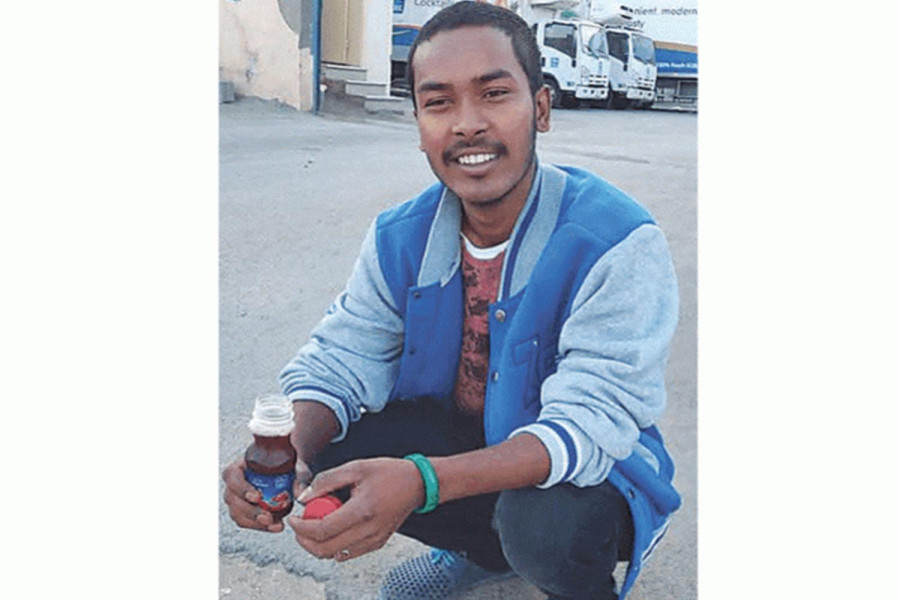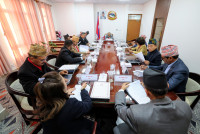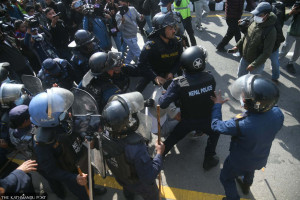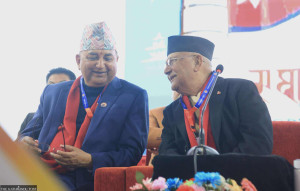National
Nepali faces death sentence in Saudi Arabia
Murder convict Sahil BK, 26, awaits execution after victim’s family rejects blood money offer.
Hom Karki & Samjhana Rasaili
Tul Bahadur BK had spent years working in the Gulf. One day, his son, Sahil, called with a message. “Father, you’ve worked enough in the Gulf. It’s time to come back. I’ll take care of the family now,” Sahil, then a Grade 11 student, said.
After years of enduring harsh conditions abroad to support his family, Tul Bahadur finally saw a chance of returning home. But little did he know this call would set his family on a tragic path that no one had foreseen.
In January 2014, Tul Bahadur was yet to return home when his son, Sahil, was offered a position as a driver and salesman with Saudi Arabia’s National Agricultural Development Company (NADEC). Sahil flew to Saudi Arabia that same month. The company took care of all expenses, including airfare, visa, health check-ups, and recruitment agency fees.
Sahil’s starting salary was 1,200 riyals, while his father, who had worked in the Gulf for around 15 years, earned 1,000 riyals. After his son secured a stable job, Tul Bahadur returned to his home in Tanahun, Nepal.
Sahil used to send around Rs70,000 to Rs80,000 every month. With that money, Tul Bahadur was able to marry off his daughter, build a house, and even take out a loan of Rs900,000. Sahil stayed in regular contact with the family, but in October 2019, all communication with him abruptly ceased.
After not hearing from him for some time, Tul Bahadur reached out to Bhakta Narayan Shrestha, a colleague of Sahil. He asked, “I haven’t heard from Sahil in days. His phone is off. Where is he?”
There was a delayed response from Bhakta Narayan: “The police have arrested Sahil. He killed his boss.” The news left the family in shock. His wife, Parvati, fainted, and Tul Bahadur’s lips went dry. He knew all too well about Saudi Arabia’s strict “an eye for an eye” law under Sharia, where life is repaid with another.
Three months later, in January 2020, Tul Bahadur finally received a call from Sahil. He had been desperate to talk to his son. “He said, ‘I didn't mean to kill. The cause was a cybercrime,’” Tul Bahadur shared with Kantipur. “I couldn’t say much as he was in jail, but I told him to take care of his health.”
On October 8, 2019, a dispute had broken out between Sahil and his manager, Abdul Ayaz, an Indian national, over pictures and videos of Sahil uploaded on Facebook.
Although in separate rooms, Sahil and Ayaz stayed in the same camp. After seeing his pictures and videos online, Sahil went to Ayaz’s room. Sahil believed that Ayaz had uploaded the content on Facebook. A brief argument turned into a violent clash, and in the heat of the moment, Sahil stabbed Ayaz. Ayaz later succumbed to his injuries.
Sahil told the police, “Ayaz posted inappropriate pictures on my Facebook account. When I went to his room to confront him, we argued. He pushed me away with his hands.” He added, “In a fit of rage, I grabbed a kitchen knife and attacked him.”
Sahil himself informed the police about the incident. When the police arrived, Sahil was sitting near Ayaz’s lifeless body. Filipino and Nepali coworkers also provided statements confirming that Sahil was responsible for the murder. Sahil later shared this account with his parents in Tanahun.
The local court, through the Ministry of Foreign Affairs of Saudi Arabia, sought the opinion of the victim’s family in Hyderabad, India, on blood money. Ayaz’s wife, Jabina Begum, rejected the blood money offer.
The Nepali Consulate General in Jeddah had contacted the victim’s family and sent a letter to the Ministry of Foreign Affairs, requesting further efforts from the Nepali Embassy in Delhi to seek forgiveness from the victim’s family before the seventh hearing at the criminal court in September 2021.
After Ayaz’s family rejected the ‘blood money’ offer, the lower court in Saudi Arabia sentenced Sahil to death on November 15, 2021. The Appeal Court upheld this decision on February 2, 2022. Nepal’s Consulate General’s office then moved the Supreme Court.
The top court also upheld the death sentence on April 4 last year. The Nepali mission informed Sahil’s family of this decision following June. “Sahil has been sentenced to death. We don’t know when or where the execution will take place,” said Tul Bahadur.
Tul Bahadur expressed frustration at the lack of support in arranging a meeting with the victim’s family in Hyderabad to seek forgiveness. “There was an unfortunate incident, and my son has been in jail for six years. Many others in similar situations have been pardoned after paying blood money. It would have been better to reach out to the victim’s family in India, but we couldn’t,” he said.
Tul Bahadur’s long journey in the Gulf had begun almost two decades before his son’s troubles. He first went to Saudi Arabia in 2001 in search of work. Seeing better earning opportunities, he moved to Qatar and later to the UAE.
After his son started earning in Saudi Arabia, Tul Bahadur returned home. However, family responsibilities forced the 51-year-old Tul Bahadur to return to foreign employment when his son was imprisoned.
Tul Bahadur went to the Maldives a year ago to support the family. Since then, his wife Parbati has been seeking ways to get their son released from prison, reaching out to politicians and government bodies. “My 26-year-old son is facing a death sentence,” she told the Post on Monday.
“I haven’t heard from him in three months. I wish we could save him. He could have stayed in prison for as long as necessary, but what a terrible fate he has!”
According to Foreign Ministry spokesperson Krishna Prasad Dhakal, Sahil has been transferred from the Taif prison to Jeddah. “Diplomatic efforts are underway to save Sahil’s life. The embassy in Delhi has also made efforts,” he told Kantipur, the Post’s sister publication. “However, the victim’s family has refused to agree to a pardon.”
The Nepali Consulate Office has requested permission from the prison administration to visit and obtain updates on Sahil’s condition.




 14.12°C Kathmandu
14.12°C Kathmandu














%20(1).jpg&w=300&height=200)

